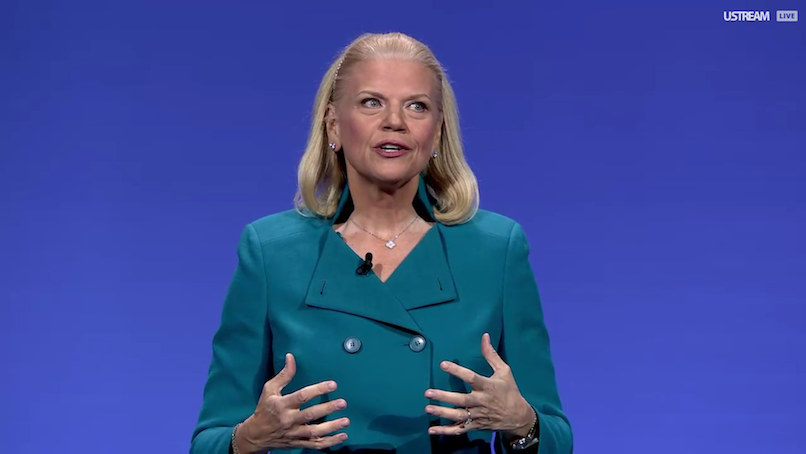 CLOUD
CLOUD
 CLOUD
CLOUD
 CLOUD
CLOUD
Updated Tuesday with comments from IBM Chief Executive Ginni Rometty’s keynote:
As rivals public cloud providers such as Amazon Web Services and Microsoft Azure keep stealing business from traditional data center suppliers, IBM Corp. is announcing on Monday plans to redouble its efforts to offer cloud computing technologies that let customers use them anywhere they want.
With 20,000 of its closest friends flocking to Las Vegas starting Monday, IBM Corp. will use its annual InterConnect conference (pictured) this week to roll out a slew of new products, partnerships and initiatives that emphasize that hybrid cloud strategy, allowing companies to use the technologies in public clouds, private clouds and their own data centers. (* Disclosure below.)
“The IBM cloud is the platform for the next era of business,” IBM Chairman and Chief Executive Ginni Rometty (pictured) said during her keynote Tuesday at InterConnect. She laid out three basic tenets of IBM’s cloud strategy: It’s built for the demands of the enterprise, it’s focused above all on data availability and protection, and it leverages Watson “cognitive” technologies to extract insights from that data.
Rometty placed a particular focus on making sure each enterprise’s data stays with that enterprise, drawing a distinction from others, without naming key rivals such as Google Inc., Amazon.com Inc. and Facebook Inc. “We’re here to help you get a competitive advantage,” she said. “Your insights are not shared with someone else. They’re not for some big knowledge graph for someone else.”
The new products include an application container service, which allows software to run independently on multiple operating systems and hardware, that’s based upon the company’s Bluemix cloud development platform. It’s intended to help developers build more secure applications more quickly. The service uses the Kubernetes container orchestration platform to automatically manage the infrastructure needed to create, run and secure applications in containers for deployment across multiple systems.
The Bluemix Container Service automatically provisions, updates and monitors containers developers use to create applications. IBM is adding a number of tools to address perceived security weaknesses in containers, including Vulnerability Advisor, a Bluemix tool for scanning and flagging security issues, and integration with the company’s X-Force Exchange threat intelligence-sharing network. X-Force Exchange data is continually funneled into the new service so that each container can be continuously checked for potential malware, breaches or vulnerabilities.
Other container features include the ability to securely store and access data across multiple platforms, controls for isolating and managing container capacity, automatic load-balancing and performance-based resource monitoring. IBM has been a contributor to both the Kubernetes and Docker projects since 2014, and Bluemix itself is built on a container-native foundation. Don Boulia, general manager of cloud developer services at IBM, told SiliconANGLE the company is committed to supporting open-source-based container evolution.
IBM will also show off new hybrid cloud software and services that bridge data and applications that run across on-premises, private cloud and public cloud environments. The Cloud Integration suite is said to enable customers to access business data from cloud services, messaging platforms and applications using easy-to-discover application program interfaces. There’s also a set of new cloud storage services that IBM says speed access to more types of data and derives more value from it.
“We continue to see this movement from the early days of the cloud with a focus on infrastructure and cost savings,” Boulia said. Now, customers are looking to get more value from new technologies further up the service chain into platform technologies and applications such as blockchain and artificial intelligence.
Despite residing in the shadow of public cloud leaders Amazon.com Inc. and Microsoft Corp., IBM’s cloud initiatives, along with its Watson intelligent analytics and question-answering platform, encourage some analysts.
“We believe investors underestimate the transformation of IBM to a cognitive and cloud platform through investments that are largely in place today,” Morgan Stanley analyst Katy Huberty wrote in a note to clients last week. She said the firm thinks IBM‘s $3 billion public cloud business is growing in line with the overall market, at a 33 percent compound annual growth rate through 2020, with profit margins rising to match the industry average by then.
Others, however, think IBM may face further revenue and profit pressures for some time to come. “In our view, the IBM model is still in transformation mode, and there is not enough predictability as relates to the revenue and margin trends of cognitive- and cloud-based revenue streams,” Barclays analyst Mark Moskowitz said in a recent note to clients. “Plus, we are concerned these two vectors could carry less recurring revenue and potentially more volatile margin trend-lines.”
Not surprisingly, IBM will unveil some new services for Watson, which is IBM Chief Executive Ginni Rometty’s biggest bet for the company’s future growth. IBM’s financial services developer cloud is getting a set of building blocks that developers can use to build applications that leverage Watson in combination with technologies such as blockchain, cognitive analytics and big data.
Initially available in beta test, the financial cloud will give developers the ability to build in customer-focused analytics, regulatory compliance analytics, security, privacy and compliance-readiness to their applications, IBM said, and simplify the tasks of selection, mapping and data integration, allowing developers to use IBM services or combine them with their own data.
There’s also a new cloud-based service IBM calls a “cognitive assistant” that uses Watson to support the management of networks of smartphones, tablets, laptops, Internet of Things devices and other endpoints. Finally, IBM said it’s partnering with Galvanize Inc., a tech learning community, on new cognitive, cloud and data science training initiatives based on the IBM Cloud, with the aim of increasing the pool of cognitive developers and data scientists.
With reporting from Robert Hof
(* Disclosure: SiliconANGLE Media’s video studio theCUBE is a media partner at InterConnect. Neither IBM nor other conference sponsors has editorial influence on content on theCUBE or SiliconANGLE.)
THANK YOU